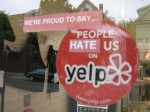On paper, Yelp.com seems like a great idea. Consumers can log in to provide feedback about different restaurants, hotels, or other small businesses they have visited. They can offer small business owners either words of praise, or of constructive criticism; and, they can ensure that other, like-minded consumers benefit from their own experience.
In reality, though, Yelp does not always work out this way. The feedback small business owners receive is sometimes positive, and sometimes constructive, but in many cases it can be totally unreasonable. You can get a bad review from a disgruntled customer, a former employee, or even a rival company. The veracity of these reviews is irrelevant; if a one-star pan is the first thing an online searcher finds about your company on Google, you’re sure to start losing business in a hurry.
The reason Yelp is the way it is could be a whole other post, but what small business owners really want to know is this: What can be done to fix those bad Yelp reviews?
There is good news and bad news here. The first thing that should be noted is that a Yelp review cannot be “removed” or deleted, at least not by you, the small business owner. Suing over the bad review would, more likely than not, prove less than fruitful, as well. Not only would it be expensive and time-consuming, but lawsuits against online review sites almost never get anywhere — freedom of speech, and all that.
While you, as the small business owner, cannot change the Yelp review, the person who wrote it can — which is why many small business owners are tempted to respond to bad reviews, to try to change the mind of the consumer reviewer. A word of significant caution is in order here, though. For one thing, a review that conveys anger or displeasure will only make your company’s online reputation problems worse. And for another thing, responding to a review draws more attention to it, and even makes the review gain traction in the Google rankings.
Responding to a bad review can sometimes be effective, if you are kind and patient and seek to resolve the customer’s issue, rather than just make your own problem go away. Offering the consumer a free product or a gift card, in exchange for taking down the review, is a method that sometimes yields good results.
Generally speaking, however, the best bet isn’t to try to undo a bad review, but rather to suppress it. In other words, small business owners shouldn’t spend too much time trying to combat Yelp reviews head on. Instead, see to it that there is plenty of positive information about your company on the Web, effectively drowning out those negative Yelp reviews.
A professional reputation management firm can help with this, but, in terms of a DIY review suppression campaign, it’s all about high volumes of positive content. Buy up all the exact-match domain names you can — so, if your business is called Hawkeye BBQ, get hawkeyebbq.com, .net, and .org, and so on. Also register for all the social network accounts you can, and fill all of these domains with regular, compelling content that portrays your business in a positive light.
Some small business owners are skeptical about this methodology. It seems, perhaps, like ignoring the real problem of Yelp itself — but that’s not the right way to look at it at all. What you’re doing, amassing all of that positive content, is building a defensive wall of good publicity — one brick at a time. The more bricks you’ve got — the more compelling content you produce — the less likely those Yelp reviews are to crack it, and show up on the first page of Google!
About the Author: Rich Gorman is direct response marketer and reputation management expert. He operates the official blog for the Direct Response industry where he shares his thoughts on Direct Response Marketing.
Photo Credit: optimum7.com



Rich is spot on: Fill your business’ first page search results with other positive content that will balance or overwhelm bad reviews. Reach150 is exactly a such a site. Google ‘BMW of Mountain View’ for an example of a dealership that is getting 80X positive recommendations vs. negative reviews on Yelp.